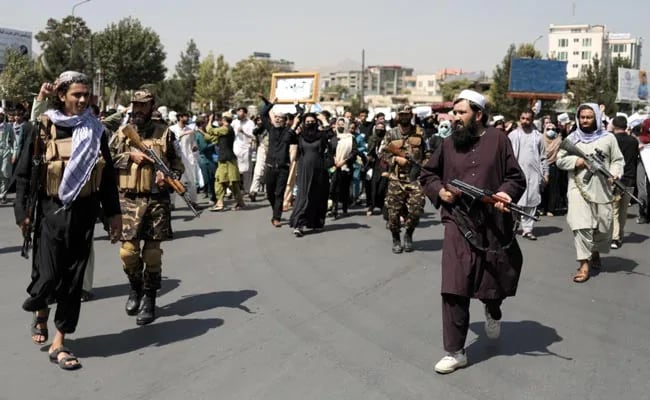
In a leafy lane in Delhi's Diplomatic Enclave, Afghanistan's embassy is grappling with a question confronting Afghan diplomats in capitals across the world triggered by the hasty, unseemly exit of former President Ashraf Ghani and the rapid takeover by the Taliban - which authority does it now serve?
The embassy in India - just like Afghanistan's embassies across the world - has chosen to maintain that it continues to represent the earlier Afghanistan Republic, using the arguable logic that while Mr Ghani and several of his ministers may have fled, he and his government did not resign, keeping alive, so to speak, the authority of the erstwhile Republic.
At the Delhi embassy, the red-and-green flag of the earlier Afghan Republic has not been replaced by the austere black-and-white pennant of the Taliban's Islamic Emirate. The portrait of former President Ghani continues to hang from the walls.

The embassy in India - just like Afghanistan's embassies across the world - has chosen to maintain that it continues to represent the earlier Afghanistan Republic.
It would be wrong, an official who spoke on condition of anonymity told me, to give legitimacy to a regime that has seized power by force. The Taliban, he said, does not represent all of Afghanistan. The Islamic Emirate may have de facto control of Afghanistan, but not de jure, the official added, a stance he claims is similar to that of all Afghanistan embassies spread across the globe, who, he says, are in regular touch with each other. This strategy, he says, is being steered by former ministers, almost all of whom are in exile.
The embassies have been emboldened by the reluctance of much of the world community, including India, in recognising the Taliban interim government.
The official said the Taliban had reached out to them on one occasion, a few weeks ago, but the embassy told them their allegiance remains with the erstwhile Republic until their (the Taliban) government receives wider global recognition. Until then, the embassy is operating in a sort of jurisdictional twilight zone, mainly providing consular services to the sizeable Afghan diaspora in India.
Practical problems, loom though - mainly of funds. The normal remittances from Kabul have ceased. The official told me they have cut costs and trimmed staff strength, mainly by laying off some of its Indian employees. "We have funds to last us a few months," he said. What after that? The official said that diplomats and bureaucrats like him are hopeful that the ground reality in Afghanistan will change, with the emergence of a united resistance to the Taliban.

The Islamic Emirate may have de facto control of Afghanistan, but not de jure, an official at the embassy in India said.
During the previous Taliban regime, which ruled Afghanistan from1996-2001, a large swathe of the country's north remained under the control of a coalition of anti-Taliban commanders known as the "Northern Alliance". Countries like India recognised the Alliance as Afghanistan's government in exile, providing legitimacy and funds to the Afghan embassy in Delhi. This time, however, every pocket of anti-Taliban resistance has collapsed, including the holdout Panjshir Valley region north of Kabul. The whereabouts of the resistance's main leaders, Ahmad Massoud, son of the late Northern Alliance leader Ahmad Shah Massoud, and former Vice President Amrullah Saleh, remain unclear.
But the official was hopeful. "The Taliban are not strong," he said, "we were weak. If we unite, things will be different."
(Sreenivasan Jain is Group Editor, NDTV)
Disclaimer: The opinions expressed within this article are the personal opinions of the author. The facts and opinions appearing in the article do not reflect the views of NDTV and NDTV does not assume any responsibility or liability for the same.
Track Latest News Live on NDTV.com and get news updates from India and around the world

